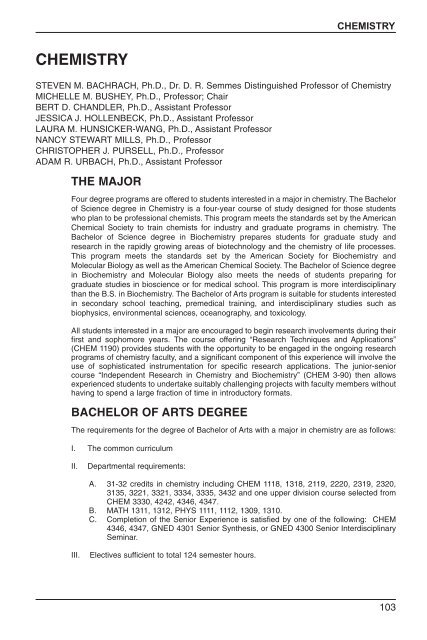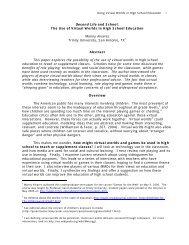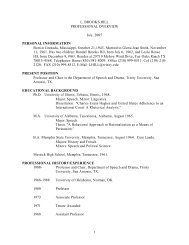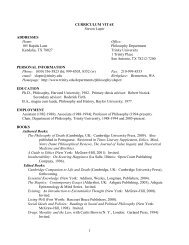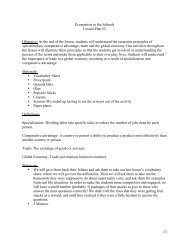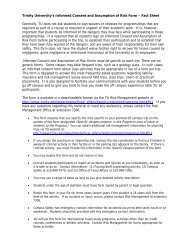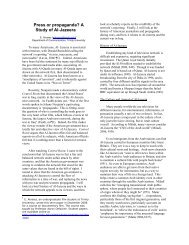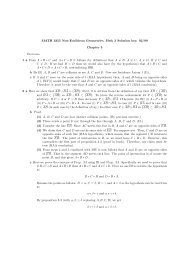- Page 1:
CONTENTS 2006-2007 Academic Calenda
- Page 5 and 6:
TABLE OF CONTENTS Academic Calendar
- Page 7 and 8:
TABLE OF CONTENTS Incomplete Grades
- Page 9 and 10:
TABLE OF CONTENTS Physics and Astro
- Page 11 and 12:
2006-2007 ACADEMIC CALENDAR 2006-20
- Page 13 and 14:
2006-2007 ACADEMIC CALENDAR FALL SE
- Page 15 and 16:
2006-2007 ACADEMIC CALENDAR APRIL A
- Page 17 and 18:
2006-2007 ACADEMIC CALENDAR SUMMARY
- Page 19 and 20:
GENERAL INFORMATION The Department
- Page 21 and 22:
GENERAL INFORMATION Boleyn Zilker B
- Page 23 and 24:
GENERAL INFORMATION Dr. Burton E. G
- Page 25 and 26:
GENERAL INFORMATION Newman Family F
- Page 27 and 28:
GENERAL INFORMATION Synod of the Su
- Page 29 and 30:
ENROLLMENT INFORMATION ADMISSION PO
- Page 31 and 32:
ENROLLMENT INFORMATION Registration
- Page 33 and 34:
ENROLLMENT INFORMATION Approval for
- Page 35 and 36:
ENROLLMENT INFORMATION examination.
- Page 37 and 38:
FINANCIAL AID FINANCIAL AID FINANCI
- Page 39 and 40:
FINANCIAL AID reason, ceases to be
- Page 41 and 42:
FINANCIAL AID Financial aid will be
- Page 43 and 44:
DEGREE REQUIREMENTS THE COMMON CURR
- Page 45 and 46:
DEGREE REQUIREMENTS Departments and
- Page 47 and 48:
DEGREE REQUIREMENTS Understanding H
- Page 49 and 50:
DEGREE REQUIREMENTS Students denied
- Page 51 and 52:
DEGREE REQUIREMENTS RESIDENCY REQUI
- Page 53 and 54:
ACADEMIC REGULATIONS SEMESTER HOURS
- Page 55 and 56:
ACADEMIC REGULATIONS GRADES IN MAJO
- Page 57 and 58:
ACADEMIC REGULATIONS SATISFACTORY P
- Page 59 and 60:
ACADEMIC REGULATIONS Students on pr
- Page 61 and 62: GRADUATE STUDIES * Students who hav
- Page 63 and 64: GRADUATE STUDIES SPECIAL REQUIREMEN
- Page 65 and 66: INDEPENDENT STUDY No more than 6 se
- Page 67 and 68: STUDENT EXPENSES STUDENT EXPENSES U
- Page 69 and 70: STUDENT EXPENSES Required Fees Each
- Page 71 and 72: STUDENT EXPENSES information is rea
- Page 73 and 74: STUDENT EXPENSES VETERANS’ BENEFI
- Page 75 and 76: COURSE ABBREVIATIONS COURSE ABBREVI
- Page 77 and 78: AMERICAN INTERCULTURAL STUDIES II.
- Page 79 and 80: ART AND ART HISTORY ART AND ART HIS
- Page 81 and 82: ART AND ART HISTORY ART COURSES GEN
- Page 83 and 84: ART AND ART HISTORY ART 4-52 ART 23
- Page 85 and 86: ART AND ART HISTORY ART 3398 ART 43
- Page 87 and 88: ART AND ART HISTORY ARTH 3335 ARTH
- Page 89 and 90: ART AND ART HISTORY ARTH 3392 ARTH
- Page 91 and 92: BIOLOGY 1. Completion of BIOL 1311,
- Page 93 and 94: BIOLOGY AREA A: THE INTRODUCTORY CO
- Page 95 and 96: BIOLOGY BIOL 3431 BIOL 3432 BIOL 34
- Page 97 and 98: BIOLOGY BIOL 3446 BIOL 3447 BIOL 34
- Page 99 and 100: BUSINESS ADMINISTRATION BIOL 4399 d
- Page 101 and 102: BUSINESS ADMINISTRATION MINOR IN CO
- Page 103 and 104: BUSINESS ADMINISTRATION BACHELOR OF
- Page 105 and 106: BUSINESS ADMINISTRATION ACCT 4344 A
- Page 107 and 108: BUSINESS ADMINISTRATION BUSN 3372 B
- Page 109 and 110: BUSINESS ADMINISTRATION FNCE 3-90 F
- Page 111: BUSINESS ADMINISTRATION MKTG 4381 M
- Page 115 and 116: CHEMISTRY THE MINOR A minor in chem
- Page 117 and 118: CHEMISTRY mass spectrometry to solv
- Page 119 and 120: CHEMISTRY CHEM 4346 CHEM 4347 CHEM
- Page 121 and 122: CLASSICAL STUDIES GREEK Requirement
- Page 123 and 124: CLASSICAL STUDIES CLAS 1303 CLAS 13
- Page 125 and 126: CLASSICAL STUDIES CLAS 3371 CLAS 3-
- Page 127 and 128: CLASSICAL STUDIES PHIL 4381 PHIL 43
- Page 129 and 130: COGNITIVE SCIENCE LATN 3303 LATN 33
- Page 131 and 132: COMMUNICATION III. 1. Nine (9) seme
- Page 133 and 134: COMMUNICATION COMM 2320 COMM 3120 C
- Page 135 and 136: COMMUNICATION COMM 3363 COMM 3364 C
- Page 137 and 138: COMPARATIVE LITERATURE COMPARATIVE
- Page 139 and 140: COMPARATIVE LITERATURE CMLT 1300 DR
- Page 141 and 142: COMPUTER SCIENCE SENIOR SOFTWARE Re
- Page 143 and 144: COMPUTER SCIENCE CSCI 1323 CSCI 219
- Page 145 and 146: COMPUTER SCIENCE CSCI 3352 CSCI 335
- Page 147 and 148: ECONOMICS ECONOMICS RICHARD V. BUTL
- Page 149 and 150: ECONOMICS III. Senior Experience. T
- Page 151 and 152: ECONOMICS ECON 3329 ECON 3330 ECON
- Page 153 and 154: ECONOMICS ECON 3348 ECON 3351 ECON
- Page 155 and 156: EDUCATION ECON 4-98 EDUCATION Topic
- Page 157 and 158: EDUCATION III. Academic Foundations
- Page 159 and 160: EDUCATION ENGL 3329* Jewish Literat
- Page 161 and 162: EDUCATION CERTIFICATION FOR GRADES
- Page 163 and 164:
EDUCATON Political Science Concentr
- Page 165 and 166:
EDUCATION VI. Plan Descriptions A.
- Page 167 and 168:
EDUCATION Latin 6-12 Certification
- Page 169 and 170:
EDUCATION Elementary emphasis: A mi
- Page 171 and 172:
EDUCATION EDUC 2108 EDUC 3301 Semin
- Page 173 and 174:
EDUCATION EDUC 5187 EDUC 5334 EDUC
- Page 175 and 176:
EDUCATION EDUC 5382 Psychological A
- Page 177 and 178:
EDUCATION EDUC 5636 EDUC 5646 EDUC
- Page 179 and 180:
EDUCATION EDUC 6380 EDUC 6381 EDUC
- Page 181 and 182:
ENGINEERING SCIENCE ENGINEERING SCI
- Page 183 and 184:
ENGINEERING SCIENCE First Year Seme
- Page 185 and 186:
ENGINEERING SCIENCE convolution, fr
- Page 187 and 188:
ENGINEERING SCIENCE ENGR 4165 ENGR
- Page 189 and 190:
ENGLISH ENGLISH VICTORIA AARONS, Ph
- Page 191 and 192:
ENGLISH ENGL 1301 ENGL 1302 ENGL 13
- Page 193 and 194:
ENGLISH ENGL 3302 ENGL 3303 ENGL 33
- Page 195 and 196:
ENGLISH ENGL 3346 ENGL 3347 ENGL 33
- Page 197 and 198:
ENGLISH ENGL 3375 ENGL 3380 ENGL 33
- Page 199 and 200:
ENVIRONMENTAL STUDIES ENGL 4327 ENG
- Page 201 and 202:
FILM STUDIES MINOR FILM STUDIES MIN
- Page 203 and 204:
GENERAL EDUCATION GNED 1306 GNED 33
- Page 205 and 206:
GEOSCIENCES 3. Participation in GEO
- Page 207 and 208:
GEOSCIENCES GEOS 3120 GEOS 3300 GEO
- Page 209 and 210:
HEALTH CARE ADMINISTRATION GEOS 439
- Page 211 and 212:
HEALTH CARE ADMINISTRATION maker. T
- Page 213 and 214:
HEALTH CARE ADMINISTRATION HCAD 538
- Page 215 and 216:
HEALTH CARE ADMINISTRATION basic de
- Page 217 and 218:
HISTORY HCAD 3350 HCAD 3383 HCAD 3-
- Page 219 and 220:
HISTORY HIST 1311 HIST 1320 HIST 13
- Page 221 and 222:
HISTORY UPPER-DIVISION COURSES Thes
- Page 223 and 224:
HISTORY HIST 3340 HIST 3344 HIST 33
- Page 225 and 226:
HISTORY HIST 3374 HIST 3376 The Old
- Page 227 and 228:
INTERNATIONAL STUDIES INTERNATIONAL
- Page 229 and 230:
INTERNATIONAL STUDIES Latin America
- Page 231 and 232:
INTERNATIONAL STUDIES COMM 4-90 ENG
- Page 233 and 234:
INTERNATIONAL STUDIES works of Vrub
- Page 235 and 236:
INTERNATIONAL STUDIES International
- Page 237 and 238:
INTERNATIONAL STUDIES LATIN AMERICA
- Page 239 and 240:
INTERNATIONAL STUDIES INTERNATIONAL
- Page 241 and 242:
LINGUISTICS LING 1300 Introduction
- Page 243 and 244:
MATHEMATICS MATHEMATICS EDUARDO C.
- Page 245 and 246:
MATHEMATICS thesis. The remaining t
- Page 247 and 248:
MATHEMATICS will also be covered. T
- Page 249 and 250:
MATHEMATICS MATH 4363 MATH 4364 MAT
- Page 251 and 252:
MEDIEVAL AND RENAISSANCE STUDIES MD
- Page 253 and 254:
MODERN LANGUAGES AND LITERATURES CA
- Page 255 and 256:
MODERN LANGUAGES AND LITERATURES RU
- Page 257 and 258:
MODERN LANGUAGES AND LITERATURES ML
- Page 259 and 260:
MODERN LANGUAGES AND LITERATURES CH
- Page 261 and 262:
MODERN LANGUAGES AND LITERATURES FR
- Page 263 and 264:
MODERN LANGUAGES AND LITERATURES GE
- Page 265 and 266:
MODERN LANGUAGES AND LITERATURES RU
- Page 267 and 268:
MODERN LANGUAGES AND LITERATURES SP
- Page 269 and 270:
MUSIC MUSIC KENNETH GREENE, D.M.A.,
- Page 271 and 272:
MUSIC In addition, 7 semester hours
- Page 273 and 274:
MUSIC Required Performance Attendan
- Page 275 and 276:
MUSIC MUSC 1403, 1404 Theory and Co
- Page 277 and 278:
MUSIC MUSC 3221, 3222 Diction for S
- Page 279 and 280:
MUSIC MUSC 3342 MUSC 3344 MUSC 3346
- Page 281 and 282:
MUSIC MUSC 2163 MUSC 2164 MUSC 2361
- Page 283 and 284:
NEUROSCIENCE D. Supporting courses
- Page 285 and 286:
NEW MEDIA THE MINOR The requirement
- Page 287 and 288:
PHILOSOPHY PHIL 1301 PHIL 1302 PHIL
- Page 289 and 290:
PHILOSOPHY PHIL 3328 PHIL 3329 PHIL
- Page 291 and 292:
PHILOSOPHY PHIL 3356 PHIL 3359 Marx
- Page 293 and 294:
PHYSICAL EDUCATION PHED 1303 PHED 1
- Page 295 and 296:
PHYSICAL EDUCATION PHED 1111 PHED 1
- Page 297 and 298:
PHYSICAL EDUCATION PHED 1154 PHED 1
- Page 299 and 300:
PHYSICS AND ASTRONOMY GUIDELINES FO
- Page 301 and 302:
PHYSICS AND ASTRONOMY PHYS 1306 PHY
- Page 303 and 304:
PHYSICS AND ASTRONOMY PHYS 3325 PHY
- Page 305 and 306:
POLITICAL SCIENCE POLITICAL SCIENCE
- Page 307 and 308:
POLITICAL SCIENCE BUSN 3341 BUSN 33
- Page 309 and 310:
POLITICAL SCIENCE PLSI 1361 Thinkin
- Page 311 and 312:
POLITICAL SCIENCE PLSI 3341 PLSI 33
- Page 313 and 314:
POLITICAL SCIENCE PLSI 3369 PLSI 3-
- Page 315 and 316:
PSYCHOLOGY To apply for graduation
- Page 317 and 318:
PSYCHOLOGY physiological factors. I
- Page 319 and 320:
RELIGION RELIGION C. MACKENZIE BROW
- Page 321 and 322:
RELIGION UPPER DIVISION COURSES AT
- Page 323 and 324:
RELIGION RELI 3345 RELI 3346 RELI 3
- Page 325 and 326:
SCIENTIFIC COMPUTING SCIENTIFIC COM
- Page 327 and 328:
SOCIOLOGY AND ANTHROPOLOGY JOHN M.
- Page 329 and 330:
SOCIOLOGY AND ANTHROPOLOGY SOCI 232
- Page 331 and 332:
SOCIOLOGY AND ANTHROPOLOGY SOCI 334
- Page 333 and 334:
SOCIOLOGY AND ANTHROPOLOGY SOCI 3-9
- Page 335 and 336:
SOCIOLOGY AND ANTHROPOLOGY several
- Page 337 and 338:
SOCIOLOGY AND ANTHROPOLOGY ANTH 3-9
- Page 339 and 340:
SPEECH AND DRAMA SPEECH AND DRAMA S
- Page 341 and 342:
SPEECH AND DRAMA THE MINOR Two mino
- Page 343 and 344:
SPEECH AND DRAMA SPCH 2313 SPCH 235
- Page 345 and 346:
SPEECH AND DRAMA SPCH 4-85 SPCH 4-9
- Page 347 and 348:
SPEECH AND DRAMA DRAM 2354 DRAM 235
- Page 349 and 350:
SPEECH AND DRAMA DRAM 3-90 DRAM 3-9
- Page 351 and 352:
URBAN STUDIES URBAN STUDIES RICHARD
- Page 353 and 354:
URBAN STUDIES “Minor in Urban Stu
- Page 355 and 356:
URBAN STUDIES URBS 3340 URBS 3344 U
- Page 357 and 358:
WOMEN’S AND GENDER STUDIES WAGS 2
- Page 359 and 360:
WOMEN’S AND GENDER STUDIES Social
- Page 361 and 362:
BOARD OF TRUSTEES ROBERT SACHSE....
- Page 363 and 364:
BOARD OF TRUSTEES OFFICERS OF THE U
- Page 365 and 366:
FACULTY Curtis Brown Professor Phil
- Page 367 and 368:
FACULTY Rubén R. Dupertuis Assista
- Page 369 and 370:
FACULTY L. Brooks Hill Professor Sp
- Page 371 and 372:
FACULTY Chia-Wei Lee Assistant Prof
- Page 373 and 374:
FACULTY Kevin M. Nickels Associate
- Page 375 and 376:
FACULTY Norman Sherry O.R. and Eva
- Page 377 and 378:
FACULTY Elizabeth D. Ward Associate
- Page 379 and 380:
FACULTY Andrew Mihalso Music Ruby E
- Page 381 and 382:
ENDOWED PROFESSORSHIPS AND FELLOWSH
- Page 383 and 384:
TRINITY UNIVERSITY TRINITY UNIVERSI
- Page 385 and 386:
INDEX F Faculty, listing of........


